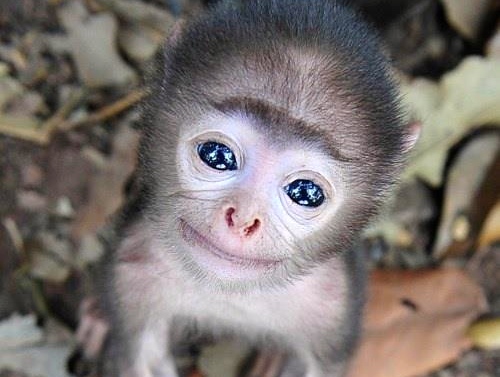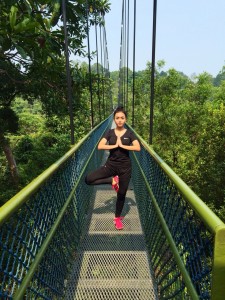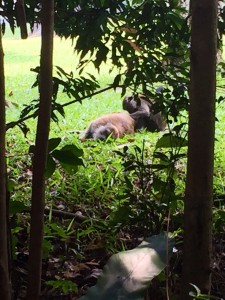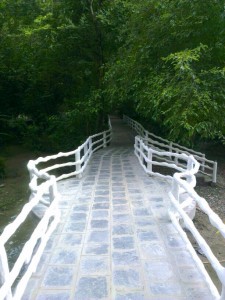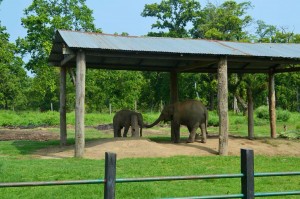I am Hayyu Nariah, a second year student in Nanyang Technological University (NTU), majoring in psychology. This blog is created in 2014, for the Conservation Psychology class that I am currently taking at this point of time that I’m typing this. All students are required to create a blog each for you readers out there, regarding the topic of our choice.
Why did I choose this module, you may ask? I am genuinely attracted to nature and I would classify myself as a nature-lover. I spend most of my free time with nature, sometimes just aimlessly walking through the trails and just immersing myself in the beauty of wildlife. (Below are some of my experiences with nature in pictorial form). I would love to engulf myself with nature more, both in and out of Singapore.
This was taken at MacRitchie Tree Top Walk in Singapore, with me killing two birds with one stone by practicing my yoga poses in the middle of my trek.
This picture of two crab-eating macaques (Macaca fascicularis) taking turns to groom each other was taken at Bukit Timah Nature Reserve (now closed to the public till March 2015 for restoration works).
This beautiful pathway is situated in Chitwan Gaida Lodge in Nepal. I was there earlier this year during the semester break and deliberately chose to stay at the lodge because of its close proximity to nature.
This was my travel buddy in Chitwan National Park, taken during the same Nepal trip mentioned above. We were lucky enough to catch glimpse of animals in their wild states. We saw rhinos, tigers, crocodiles and peacocks. There were definitely more wild animals that were so good at hiding that we didn’t get a chance to see but that means more trips to Nepal in the future!
This is a typical scene at the elephant breeding centre near the Chitwan National Park. The staff at the centre were all very adamant on their rationale of taking elephants away from their wild habitats and assist in breeding to ensure the continuity of the species.
The strongest drive in me that made me choose to sit in for this module is I was intrigued by how the earth can be both destroyed, and saved by humans, and that depends on our chosen actions. Our behavioural responses to nature are no doubt heavily dependent on our cognitive and affective processes (and that’s the most interesting part to explore in).
Why the topic of conserving primates for this project, you may ask? I find animals very pristine and just comforting companions. This perception is probably instilled by the exposure to animals that I had since young. My parents have a huge believe of the biophilia hypothesis, which suggests the instinctive bond between human beings and other living systems. They brought me to animal farms and zoos and other possible places to see animals in the most wild states possible. Such direct personal experiences justify my belief that upbringing is very important in instilling mentalities. My love for animals, and nature as a whole was derived from my experiences with Mother Nature since young.
Babies are indeed blank canvases and can be “trained” to have a preference that would most likely resonate throughout adulthood.
